Towards achieving a carbon neutral society, our CBRC member, Assoc. Prof. Dr. Prasert Reubroycharoen, in collaboration with Prof. Dr. Noritatsu Tsubaki (University of Toyama, Japan) and the Research Teams from the State Key Laboratory of High-efficiency Utilization of Coal and Green Chemical Engineering, Ningxia University (China), and the National Quality Supervision and Inspection Center for Coal and Coal Chemical Products (China) developed a cobalt-based catalyst, utilizing layered double hydroxides (LDHs) as support for CO2 methanation.
The research work entitled “Designing hydrotalcite-derived CoAlO catalysts for highly selective catalytic CO2 methanation” has been published in Fuel Processing Technology (Tier1 Journal, JCR IF = 8.129). This article is accessible at https://lnkd.in/gdvBfBtz
The excessive CO2 emissions from fossil fuel combustion lead to global warming, extreme weather, and ocean acidification. CO2, a greenhouse gas, is abundant and non-toxic, making it an ideal carbon source. CO2 capture and utilization for production of high value-added products mitigates environmental damage and turns CO2 into a resource. Therefore, the catalytic hydrogenation of CO2 with renewable hydrogen (H2) is a promising method for recycling CO2 into value-added fuels and chemicals.
Methane (CH4) is an ideal energy carrier with high energy density and a crucial feedstock for bulk chemical production as well as its ease for liquefaction and transportation. The application of Co-based catalysts in CO2 methanation have widely received extensive attention due to its low cost and high catalytic activity. Layered double hydroxides (LDHs) and its derived catalysts tend to have good stability without sintering and/or aggregation providing a promising strategy for obtaining efficient and stable catalysts with specific structure and properties. Moreover, the metal species tend to maintain high distribution by which the migration and agglomeration of metals can be restricted due to appropriate metal-support interaction. Therefore, designing hydrotalcite-derived CoAlO catalysts is feasible for achieving efficient and stable production of CH4 in CO2 methanation.
In this work, layered CoAlO catalysts with various Co/Al molar ratios were prepared by direct reduction of hydrotalcite precursors. The optimized CoAlO-1 catalyst with a Co/Al molar ratio of 1 at 300 °C achieved the highest CH4 production of 0.46 gCH4⋅gcat−1⋅h−1 at 100% CH4 selectivity and a good stability in 200-h long-life test. The catalyst possessed appropriate basicity, reducibility, and metal-support interaction for efficient catalytic CO2 methanation.

